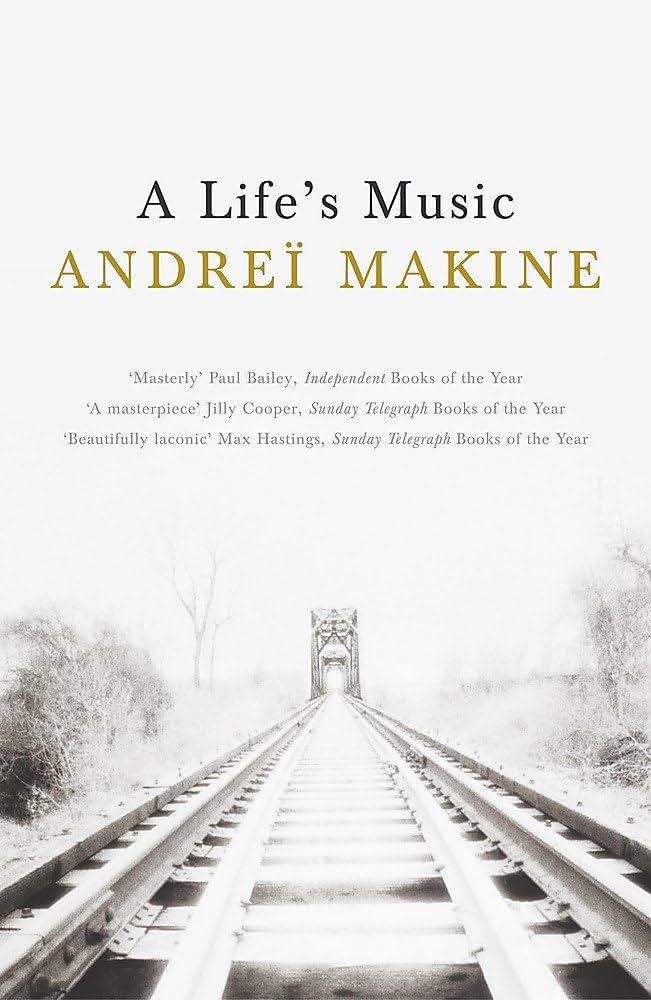Published: 5th November 2023

A Life’s Music Synopsis:
A Life’s Music is a melancholic, lyrical framed narrative. It starts with an initial narrator waiting for a train to Moscow, who is disrupted by music. He meets an old man, Alexeï Berg, playing silent piano, and during the train journey to Moscow he listens as the old man takes over the narration, telling him his life story. Alexeï Berg is about to make his debut as a concert pianist when he is told not to go home, where his parents are arrested. He flees to a relative in the country, and then when war reaches him again, he takes on the identity of a dead Russian soldier, fighting in the war and saving the life of a general. He falls dangerously in love with the general’s daughter. All throughout this novel, it becomes clear that, however much he tries, the musical part of his identity cannot be suppressed.
My Thoughts (contains spoilers):
Throughout this novel, the idea of ‘Homo Sovieticus’ – the term for the average conformist person in the Soviet Union and other countries of the Eastern Bloc – is explored and critiqued. Makine did very well at building up his argument through the narrative, so that by the end of the novel he was able to make a strong argument against the theory.
The opening frame was a really strong introduction to his critique of Homo Sovieticus. The narrator is passing the time in the station by observing the people around him and contemplating the theory. Here, through long sentences and the descriptions of many different people in the station, he highlights the enormous diversity of the people, and thus critiques the idea of Homo Sovieticus. However, he also wavers
between an image of a human mass and an image of a single cell (he often referred to biology in his imagery), to highlight the struggle to pick out individuals from the mass.
He then shows how oppression causes this, through the character of Alexeï Berg. It is already shown in Berg’s childhood that his family is targeted because of their music. Makine uses the symbol of the ‘long-nosed mask’ that people are forced to wear because of oppression. He shows how everyone around Berg seems to be wearing a metaphorical mask, avoiding eye contact with him, because they can’t be associated with him and his music. Another strong symbol is the snapping of violin strings in the fire, as a violin is burnt out of the fear of arrest and interrogation. Makine uses this as a very moving symbol for the moment that Berg is forced to suppress his musical identity in order to survive.
Throughout Berg’s story, the writing style is very lyrical and uses words connoting music, thus showing how the music of his life couldn’t truly be suppressed, and foreshadowing the moment that it bursts out of him. There are also key moments in the novel that show his struggle to hide his passion for music. The ending of his narrative shows Alexeï Berg’s catharsis, as he finally reveals his identity as a musician. This part is beautifully written and shows how the music comes “surging out”, pushing away the oppressive environment and flying out into the “nocturnal immensity of the sky beyond the windows”. This is my favourite part of the entire novel. The imagery is very powerful and shows the importance of never suppressing your own identity. Makine creates a strong feeling of satisfaction for the reader through the buildup of tension – between the need to survive and the struggle of Berg’s core identity to break through the barrier of oppression. When the music finally soars out into the night, Makine’s argument against ‘Homo Sovieticus’ is delivered.
There are many other parts of this novel that I absolutely adored, (for example Makine’s skill at creating atmosphere), and so many themes, but that would require me to write a whole book about it. I very much enjoyed this book and will definitely be reading it again in the future.
Quotes:
“The wind whips heavy white squalls against the windows. Bodies settle down against the hardness of the benches, strangers press together, like the scales of a single protective shell. Night fuses the sleepers into one living mass – a beast savouring, with every cell in its body, its good fortune at being undercover.”
“For in these small towns a thousand leagues from civilisation this is what life consists of: waiting, resignation, hot stickiness in the depths of your shoes. And this station besieged by the snowstorm is nothing other than a microcosm of the whole country’s history. Of its innermost character. The vast spaces that render any attempt at action absurd. The superabundance of space that swallows up time, that equalises all delays, all lapses of time, all plans. ‘Tomorrow’ means ‘one day, perhaps’. One day, when the space, the snows, and destiny allow it. Fatalism …”
“He would have been safer behind the barbed-wire of a camp than in possession of this lethal liberty.”
“The night through which he was advancing expressed this pain, this fear, and the irremediable shattering of the past, but this had all become music and now only existed through its beauty.”